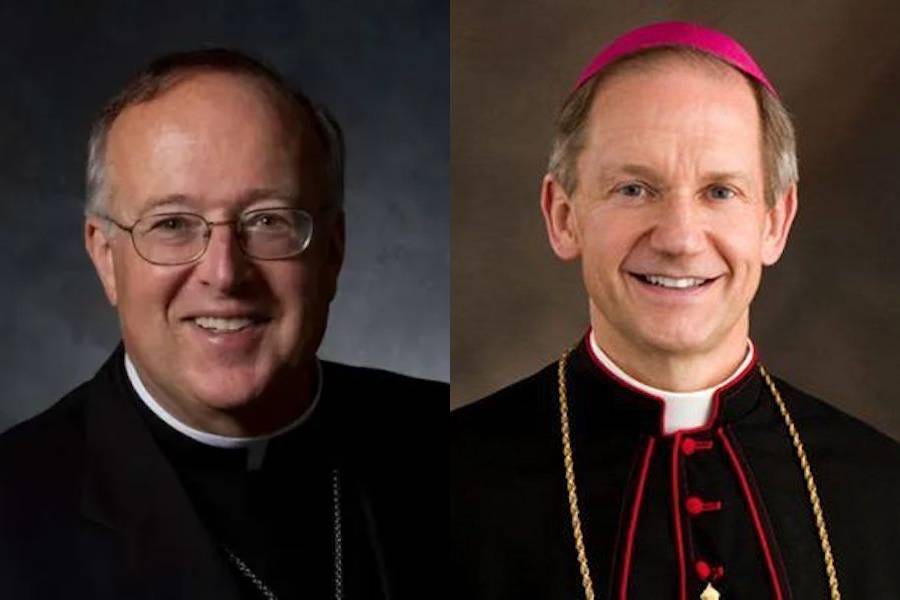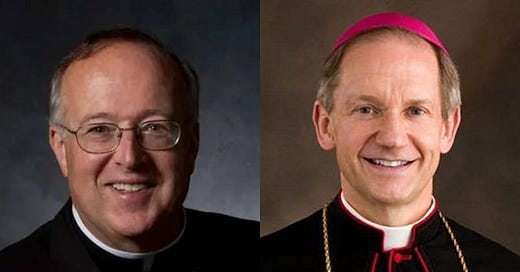
Paprocki: We’ve ‘passed beyond the point of private conversations’
After an attention-grabbing essay, Bishop Thomas Paprocki talked about heresy, Cardinal McElroy, and the obligations of bishops.

Bishop Thomas Paprocki told The Pillar Tuesday that clarifying doctrinal errors proffered by senior Church leaders is a “necessary” responsibility for bishops, and that failing to address errors in Catholic teaching will see them compounded, not abated, in discussions about the Church’s pastoral and sacramental ministry.
The bishop talked with The Pillar Feb. 28, after he published an essay charging that recent statements from several members of the College of Cardinals are contrary to Catholic teaching, and amount to heresy.
“I thought I would explore some of the canonical implications if you have a situation of a cardinal who is holding to heretical views, or publicly proclaiming and teaching heretical views,” Paprocki said of “Imagining a Heretical Cardinal,” a February 28 essay published by First Things magazine.
“I have heard the word [heresy] used privately, and since it has been coming in private conversations, I thought that perhaps since it’s been coming up in private conversations, [then] perhaps it’s time for us to have some public conversation about that. … There are not just bishops, but theologians and other faithful Catholics raising the question of heresy,” Paprocki said.
“I think the reason I did this is because this debate has become so public at this point that it seems to have passed beyond the point of just some private conversations between bishops,” the bishop said.
Start your day with Starting Seven - a daily news roundup in your inbox.
Paprocki, the Bishop of Springfield, Illinois, is both a canon and civil lawyer. In November, the bishop was elected chairman of the U.S. bishops’ conference’s committee on canonical affairs and Church governance.
While Paprocki’s First Things essay did not name specific cardinals, it cited directly a Jan. 24 essay in America magazine from Cardinal Robert McElroy, which argued that the Church should “embrace a eucharistic theology that effectively invites all of the baptized to the table of the Lord.”
McElroy later clarified that his mention of “all the baptized” would pertain only to Catholics, and not other baptized Christians.
But the cardinal also said the Church should discard “a theology of eucharistic coherence that multiplies barriers to the grace and gift of the eucharist.”
“Unworthiness cannot be the prism of accompaniment for disciples of the God of grace and mercy,” McElroy wrote, in a text quoted by Paprocki.
Paprocki’s essay said that those statements are “contrary to a ‘truth which is to be believed by divine and Catholic faith,’” and therefore constitute material heresy.
The bishop elaborated to The Pillar Tuesday, arguing that McElroy’s statement opposes a doctrine on the Eucharist which “has been the teaching of the Church, as found in the Bible, the Word of God, from the earliest days of the Church.”
Affirming that heresy is the “obstinate doubt or denial of some truth to be believed and Catholic faith,” Paprocki said rejecting either a biblical vision of sexual morality, or biblical guidance regarding reception of the Eucharist, would fit the bill.
The bishop cited St. Paul’s teaching in 1 Corinthians, which warns that “Whoever eats the bread or drinks the cup of the Lord in an unworthy manner will be guilty of profaning the body and blood of the Lord.”
But despite his direct citations of McElroy’s texts, Paprocki insisted to The Pillar that he did not intend to single out a particular cardinal for criticism.
Instead, the bishop claimed his essay meant to explore the “canonical implications” of a bishop who might teach heretical doctrine, and that he cited McElroy’s text, as well as statements from some European cardinals on homosexuality and sexual morality, as examples.
Whatever Paprocki’s intention, the bishop was direct in his assessment of McElroy’s essay, both in his essay and in subsequent conversation with The Pillar.
Addressing McElroy’s Jan. 24 points about Eucharistic worthiness, Paprocki told The Pillar that “if it’s in the Bible, then that’s something to be held as divinely taught. We say the Bible’s the Word of God. So if you’re basically saying, ‘Well, St. Paul was wrong and we shouldn’t follow St. Paul,’ that suggests to me a rejection of something that's taught in the Word of God.”
Still, despite that insistence, Paprocki said his aim was “starting a conversation.”
He also acknowledged that some theologians and canonists might not agree that McElroy's statements rise to the level of heresy.
“I'm raising some issues that I'm suggesting may be heretical. Maybe people disagree with that. Maybe they say, ‘Well, these are not necessarily [heretical], I mean, they're teachings that are contrary to what the Catholic Church has taught, but do they rise to the level of something that would invoke automatic excommunication?’”
“I didn't intend this to be taken as an accusation against anyone in particular. I didn't mention names because I didn't want this to focus on a personal debate, or a feud between bishops. I wanted to focus on the issues that were being brought up here,” Paprocki said.
“That's why I started out with ‘Imagine if,’ or ‘What if?’ In that sense, it’s not exactly hypothetical, because there are references to some recent statements. But I think I intended the discussion to be more rhetorical,” he added.
In his comments to The Pillar, Paprocki acknowledged the difference between teaching error, and facing a formal canonical declaration of heresy.
“In terms of a bishop or some competent ecclesiastical authority declaring [the crime of heresy], there would have to be something public and manifest about that. But what I'm suggesting is that you can commit the crime of heresy without any public act, and that's why it's automatic,” he said.
“In terms of declaring a penalty, I think you'd have to have some kind of a warning that would go to that person and say, ‘Look, you said this publicly. This appears to be heretical. Can you clarify what you mean by that?”
“I think there'd be an opportunity … that the Holy Spirit would guide such a cardinal to retract whatever it is that he's saying that that would be heretical,” the bishop said.
In remarks to The Pillar, Paprocki said he hopes his essay will be an exhortation to fellow bishops.
“I would hope that those who have proposed teachings which are not in conformity with what the Church has taught for the past 2,000 years, and what we find in the word of God, that they would clarify what they're trying to say, and affirm what the church does teach — that they would have the integrity to do that,” the bishop said.
On McElroy, Paprocki explained that, “I don’t know that he’s necessarily dug into a position such that if he’s challenged on it, that perhaps he would say - as I’ve said myself sometimes - that maybe I didn’t express myself very clearly. Let me try to rephrase that.”
But the bishop acknowledged that conflict among bishops is more likely than a sudden change of tune.
Still, he said there have been “some pretty fierce debates” over doctrine in the history of the Church.
“To some extent, I think that back and forth, as unpleasant as it may be, may be necessary, in terms of bringing some clarification,” Paprocki said.
“The big conversation today seems to be on matters of sexuality and marriage. We live in a culture, and the secular culture even permeates into the Church. And so if we don't say something, well that eventually seeps in and, and becomes … just becomes something that's kind of accepted” in the Church.
Paprocki compared contemporary conversations about heresy to the Church’a Arian crisis of the fourth century.
“If some bishops didn’t push back on that, we’d be Arians today. If they thought, ‘we don’t want a public disagreement, or have any lack of unity be seen here’ … if the bishops who were staying true to the Church just kept quiet, well then, we wouldn’t be where we are today in terms of having clarification about that.”
But Paprocki insisted that his perspective on contentious issues is not the only one that should matter in the Church. He said he hoped other bishops will speak into a conversation about Catholic doctrine — whether or not they agree with him.
“I don't necessarily want to make myself the expert in this, or [suggest] I’m going to be the final word on this. I'm not. I have a voice in this and so I'm expressing my voice.”
“I'm always open to speaking with a brother bishop about this. And I would certainly welcome those kinds of conversations with Cardinal McElroy or any other bishop.”
The Pillar requested comment from Cardinal McElroy regarding Bishop Paprocki’s essay. The cardinal’s office has not yet responded. In recent weeks, The Pillar has repeatedly requested an interview with McElroy regarding his approach to sexual morality, the Eucharist, and the synod on synodality.
The cardinal has not yet accepted The Pillar's request.
Editor's note: Look soon for a bonus episode of The Pillar Podcast featuring a lengthier conversation with Bishop Paprocki.





